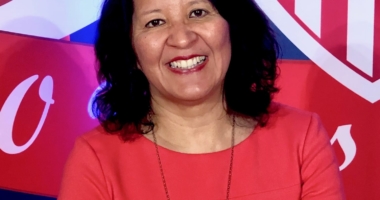Profiles in Education Equity: Ohio State Senator Peggy Lehner
 This summer, Ohio legislators passed a bill that bans expulsions and out-of-school suspensions for students in kindergarten through third grade. Ohio now joins a handful of states, including Maryland, Virginia, and Tennessee that have taken measures to cut down the number of suspensions and expulsions for early learners. One of the Ohio bill’s architects is Senator Peggy Lehner, who has chaired the Ohio Senate Education Commission for the last eight years. Ed Trust spoke to her about why suspensions don’t work, why she’s a staunch supporter of early learning, and why this was the easiest bill she’s ever passed.
This summer, Ohio legislators passed a bill that bans expulsions and out-of-school suspensions for students in kindergarten through third grade. Ohio now joins a handful of states, including Maryland, Virginia, and Tennessee that have taken measures to cut down the number of suspensions and expulsions for early learners. One of the Ohio bill’s architects is Senator Peggy Lehner, who has chaired the Ohio Senate Education Commission for the last eight years. Ed Trust spoke to her about why suspensions don’t work, why she’s a staunch supporter of early learning, and why this was the easiest bill she’s ever passed.
So what did it take to pass this bill?
Like every other state, Ohio has constantly struggled with not moving the needle. No matter what we were doing, no matter how many federal assessments we were administering, no matter what we did here in the state, nothing seemed to be happening. But early childhood education seemed to hold out a lot of hope for dealing with so many kids, particularly kids in poverty. Then in 2015, in looking at the early childhood figures, someone presented me with the fact that 36,000 kids under the age of 8 were suspended in Ohio in a given year. And it struck me — that was a huge number of kids that we were putting at a tremendous disadvantage. Because there’s nothing good about a suspension: it doesn’t help the classroom, it doesn’t help the kid. While we’re looking for silver bullets, this is something we should at least look at. When I first started talking about it, I got a lot of opposition, frankly. But somehow in the course of the last two years, that conversation has totally changed. We didn’t have a single opponent to this bill. No one came forward objecting to the bill. Teachers unions, school administrators, psychologists, hospitals, all just came forward and supported the effort. It was the easiest bill I have ever passed.
What do you think the difference was between just a few years ago when you were getting pushback?
I think that the big difference is that the whole issue of social emotional learning, and the baggage that kids bring to school with them, has sort of been elevated, and that it’s very closely connected to misbehavior. Why do kids misbehave? They misbehave because they don’t know better; they haven’t learned differently. Their lives are full of trauma, leaving them incapable of the kind of perfect little behavior that we expect of kids. I think that conversation has really become more robust in the last few years. So when [you look] at a discipline policy that does nothing to address those underlying issues in children, and when you look at the fact that a child who is suspended in kindergarten is far more likely to end up dropping out by the time they’re in high school; when you start looking at those stats, you go, “What are we doing here? Why are we doing this?” And this is just a policy we have to change. I just think that it’s a sign of the times, and it’s a very positive sign.
What advice would you give other states or districts wanting to do something similar?
The first thing I would suggest is find out how many suspensions and expulsions are already taking place. Because frankly, once I started dropping that 36,000 figure, the conversation ended. I would just be in room full of people, whether it’s teachers or parents, it didn’t matter who, legislators. And I would ask the question, “How many suspensions do you think took place, under the age of 8, in Ohio last year?” And I would get, “Oh my gosh. Probably too many. A hundred? Five hundred?” And I would say no, 36,000 — and the room would be stunned. It’s unbelievable. So that would be my first bit of advice: find out how bad the problem is in your state.
Secondly, really make use of professionals — counselors, physicians, healthcare providers, and ask them the psychological impact of a suspension on a young child. Frankly, suspension should be one of the ACES [adverse childhood experiences], because it’s that detrimental. And it’s not just the loss of academic time, being in the classroom, learning, that’s time they’ll never get back. But in addition to that, it is so traumatic for a child, particularly a child who is coming out of poverty, who is feeling that they don’t belong, that they’re not good enough to be there in the first place, which are very prevalent sentiments in kids coming out of poverty. And basically you’re saying to them, “You’re right, you don’t belong here; we don’t want you,” and that damages the child for a lifetime. To what end? Because it doesn’t improve their behavior. Does nothing for behavior. There is no upside to suspending a child. Except for, the teacher maybe can say, “Well, we have a little bit more peaceful classroom.” Which is why the other part of the bill that doesn’t get talked about as much is so important. This bill doesn’t just remove suspensions and expulsions. It requires a PBIS [positive behavior intervention support] framework within the school but then strongly encourages professional development around trauma informed instruction, cultural competency, as well as programs and curriculums such as the Good Behavior Game, Love and Logic. There are many different curricula that help positive behavior efforts in the classroom. So that’s every bit as important as the ban on the suspensions.
What about the argument you hear a lot lately about the advent of school shootings and that expulsions and detentions need to happen because they’re keeping students safe. What is your rebuttal to that?
Well, first off, this legislation is only dealing with children 8 and under, and I don’t think we have seen any kind of school violence perpetrated by an 8 year old. But I think if we look beyond that, just look at suspensions and expulsions in older kids, virtually, every school shooter that we have has been suspended or expelled from school at one point. So I would argue that it does exactly the opposite — it makes us less safe. Rather than addressing the underlying problems that are being presented by a child who is feeling isolated and bullied, etc., we throw them out of school. So they go home and they sit and they brood for a couple weeks and come back filled with resentment and anger. And end up getting suspended or expelled again. And again. And before we know it, we have a dropout who’s got himself a gun and coming back to school to show them. I think that rather than being an argument for suspensions and expulsions, it’s probably one of the strongest ones against it.
So what is the next step?
There’s a lot of implementation challenges with this bill. One of the things that we did was not be overly prescriptive as to what the positive behavior technique and curriculum needed to be, and we left that very much up to the schools. I think that they will implement those things with fidelity if there is money available. We put $2 million in the bill but it needs to be a lot more than that. So I’m going to be working in this next General Assembly to try to get that money ramped up and try to put some things in place that will make it easier to provide the professional development that teachers need. One of the provisions in the bill is that schools of education must teach positive behavior techniques, and that’s something that just hasn’t been happening. So I want to make sure that happens as well. I know our schools have been very supportive of the legislation, and they have all said yes, we absolutely should be teaching, every student should be instructed in trauma informed instruction and cultural competency, and they’re not. I don’t know why they’re so happy to see us mandate it, but they are. So, we’ll take it. Now we’ll just make sure that they do it.
What does that entail?
We can get specific. If certain things happen in a child’s life that their brain makes it basically impossible for them to behave in a certain way or to learn, there are specific strategies that teachers can be taught that help overcome some of the difficulties that these children endure. Wrapping an arm around a child and talking to them about what may have happened to them at home, for example. For many children, it’s a question of not feeling safe. A lot of times a child will be acting up out of hunger. Or maybe they didn’t get any sleep the night before because of violence in their home. If the teacher is trained to recognize those signs of trauma and is equipped to help the child deal with them, the need for suspension goes away. But more importantly, the child feels safe and is able to learn and maybe actually be successful in school.
At the end of the day, what this is all about is moving the needle on academic performance. We cannot continue to have 40 percent of our kids coming to kindergarten unprepared to learn. Not because of what they know academically, but because of the baggage that they bring with them to school. They’re not ready to learn; emotionally and physically, they’re not ready to learn. There are many things that we have to do to correct that beyond getting rid of suspensions and expulsions. That isn’t going to be a silver bullet any more than anything else has been. But, it’s part of an overall package. Another huge piece of that is high quality early childhood education. Put that in place, you put proper education of teachers, you put wraparound services to deal with some of the emotional and physical challenges young kids have. The more we start doing these things, we are gonna be able to see that needle moving, with fewer and fewer children coming to school unprepared to learn.
This sounds like a topic that is near and dear to your heart.
Yeah, it really is. One of the things that’s really been frustrating is so many of the issues, the intractable issues that we deal with on a day-to-day basis in our country — whether it’s overcrowding in our prisons, whether it’s the drug crisis, whether it’s healthcare — are all problems that if we paid more attention to prevention early in the lives of our citizens, when they’re 2, 3, 4, 5 years old, those problems would be alleviated down the road. We would actually save money. I find it very difficult, particularly with some of my male colleagues, to get them to understand the importance of early childhood education. To them, their wives maybe took their kids off to nursery school when they were little and that’s as much attention that they’ve ever paid to that preschool environment. But it is so completely critical to the development of healthy, well-educated kids and citizens and adults. I just want to scream that we do have the answers to these problems, we just have to be willing to invest in them! As Frederick Douglass said, it’s easier to build a strong child than to repair a broken man.
So have you been thinking about what your life might look like after 2020?
I get asked that question probably four times a day, and I have no idea. I will be termed out in 2020. I would like to continue to do something in the education world, just don’t know what that’s gonna be. I’ve invested a lot of time and effort into understanding education and the challenges we have, and I hope to be able to continue to use what I’ve learned. But who knows?












